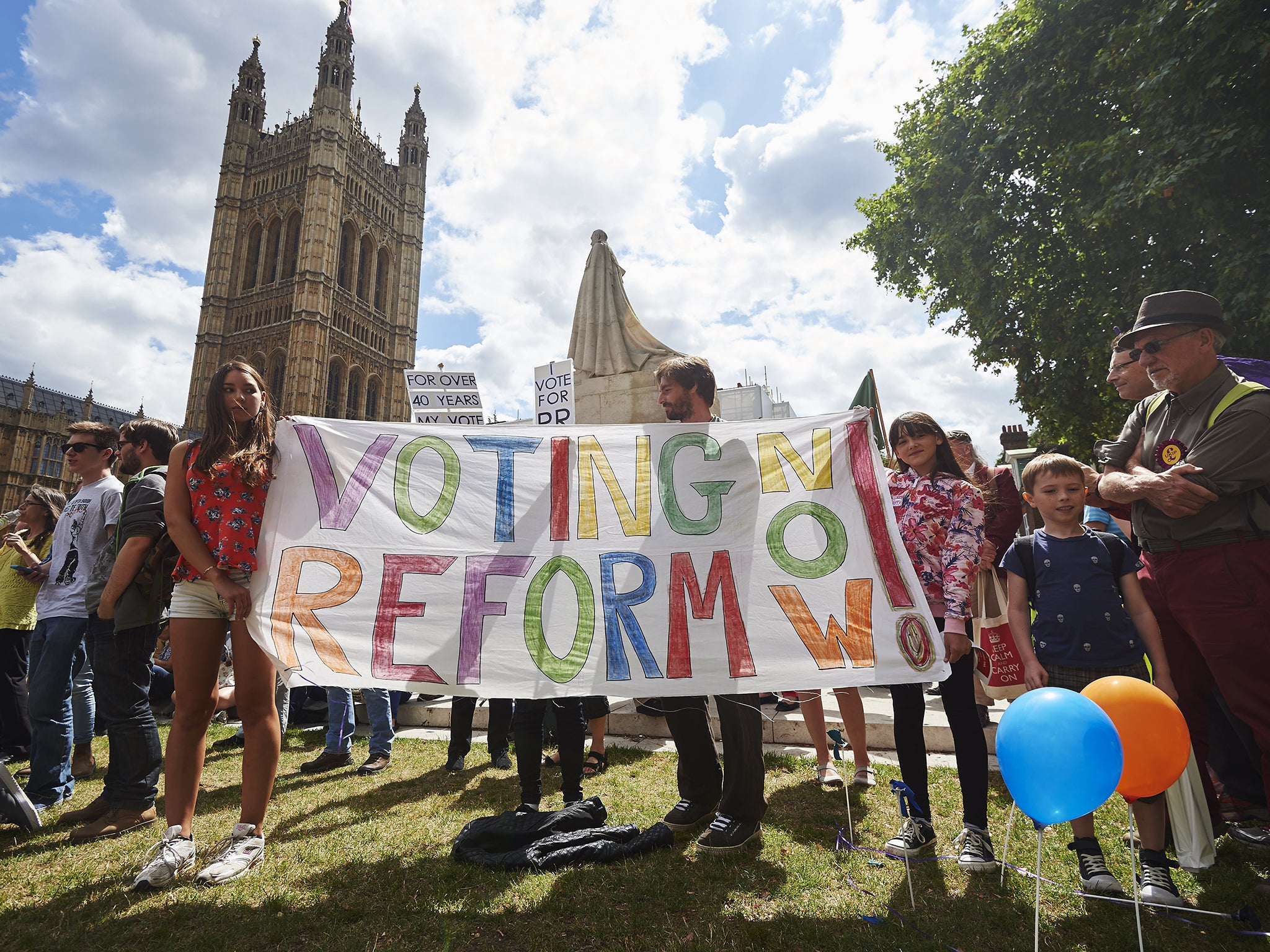Let's reboot democracy and replace our rotten electoral system
First Past The Post has been a huge contributing factor in how remote people feel from politics


Your support helps us to tell the story
From reproductive rights to climate change to Big Tech, The Independent is on the ground when the story is developing. Whether it's investigating the financials of Elon Musk's pro-Trump PAC or producing our latest documentary, 'The A Word', which shines a light on the American women fighting for reproductive rights, we know how important it is to parse out the facts from the messaging.
At such a critical moment in US history, we need reporters on the ground. Your donation allows us to keep sending journalists to speak to both sides of the story.
The Independent is trusted by Americans across the entire political spectrum. And unlike many other quality news outlets, we choose not to lock Americans out of our reporting and analysis with paywalls. We believe quality journalism should be available to everyone, paid for by those who can afford it.
Your support makes all the difference.It's not easy for politicians to admit there might be something wrong with the political system that elected them. But UK politics is in crisis. Too many people feel remote and unrepresented. Bitterness and invective on social media are replacing debate and reason. Despite the result of the Scottish independence referendum, the very future of the UK is still in question.
A political system is made up of different aspects, one of the most fundamental being the means by which we elect our representatives, and therefore our Governments, to Parliament.
Currently MPs are elected under the First Past the Post (FPTP) system, so whoever gets the most votes in a constituency wins, even if more people voted against them than for them. Whichever Party wins the most constituencies then usually forms the Government. It's simple, but it leads to absurdities - on three occasions in British history, the party with the most votes nationally has actually lost the election.
This method of electing MPs to Westminster is bad for the UK. It forces the major parties to overwhelmingly devote their resources on just a handful of constituencies, because they believe these are the ones that might change hands. It therefore fails to treat voters equally regardless of where they live. Most of all, it creates false electoral deserts where whole regions of the country are dominated by one party despite their opponents recording substantial numbers of votes.
FPTP has been a huge contributing factor in how remote people feel from politics. As vote share between the two main parties has declined, our general elections have become less and less representative. If winning an argument with the British public becomes a different task to winning the votes required to form a government, then something has gone wrong.
None of this is a means to dispute the formation of the new Conservative government in 2015. No electoral system would have produced a Labour government, because people simply didn’t trust Labour sufficiently to do that. But the results of the election should concern anyone purporting to be a democrat: in the South East, the Tories got 51% of the vote but won 93% of the seats; in the South West, they got 47% of the vote but won 94% of the seats. In the North East the situation is reversed – Labour took 47% of the vote but won 90% of the MPs. This is simply not conducive to a representative Parliament.
In Scotland, the SNP won an impressive 50 per cent of the vote, but a thoroughly disproportionate 95 per cent of the seats. However Scotland leads the way on some best practice via the Scottish Parliament and its Additional Member electoral system. Scotland’s 129 MSPs are comprised of 73 constituency members elected under FPTP, and 56 regional representatives elected via 8 additional member regions. Electors vote twice: once for a specific candidate; once for a political party.
This means the public still get a local constituency MP for their area, but they also get an election which is representative of how the country voted as a whole. No area can be ignored, and if people vote for smaller parties they have a decent chance of seeing that vote count. No system is perfect, but this one represents the optimum outcome that can be achieved.
This Wednesday, we will present a Bill in Parliament proposing Westminster adopt a similar system for electing the House of Commons. The Bill is supported by MPs from nearly all sides of the House, but anyone interested in the future health of British politics, and the country, should get behind it.
Jonathan Reynolds is the Labour Member of Parliament for Stalybridge & Hyde and Chuka Umunna is Labour Member of Parliament for Streatham.
Join our commenting forum
Join thought-provoking conversations, follow other Independent readers and see their replies
Comments